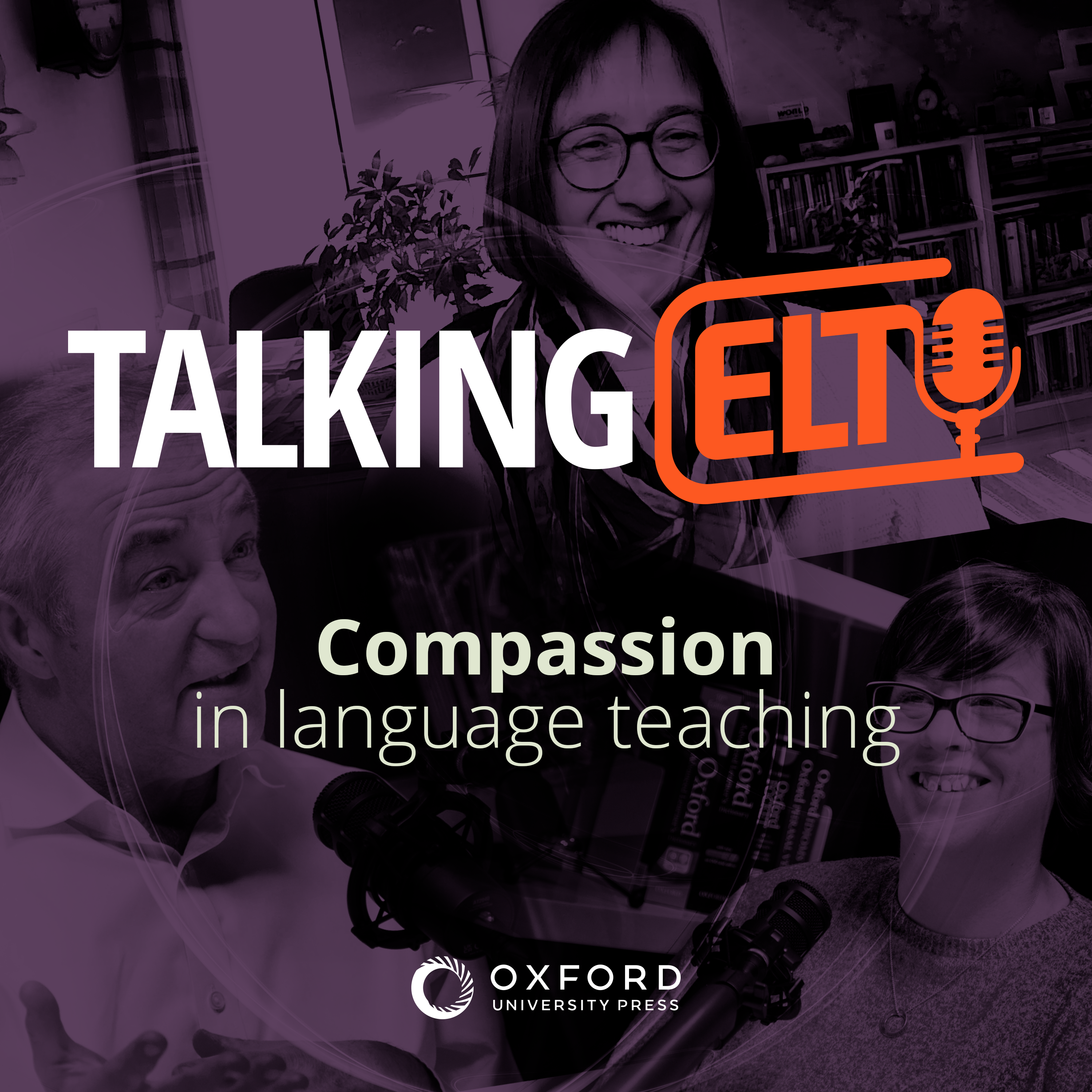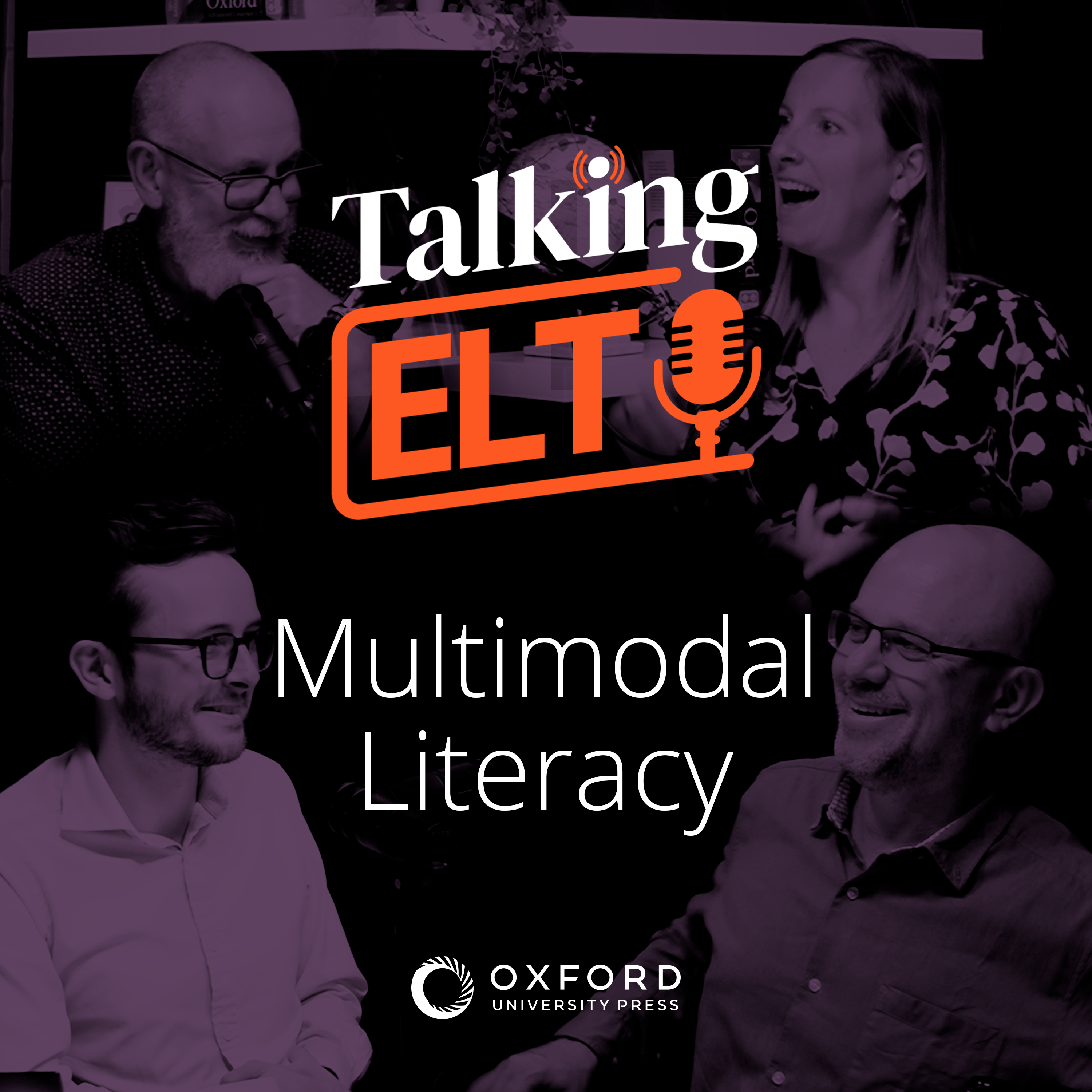Episode Transcript
[00:00:11] Speaker A: Welcome back to Talking elt, the easiest place to learn about the big issues in language teaching.
Today we're continuing our theme of compassion based language education.
I'm joined as before by Professor Sarah Mercer, author of our new book titled Compassion Based Language Education, and by Charlotte Rance, a senior professional development consultant. This is the sixth and last episode in the series on compassion based education. In this episode we'll be looking at teaching for compassion beyond the classroom. This takes us down some really interesting discussions around global citizenship, compassion for people we don't know and compassion for the planet we live on.
[00:00:58] Speaker B: When you talk about the importance of developing compassion for others as part of this teaching for compassion, part of that is about modeling compassionate behaviours. Are there other ways that teachers might approach this area of developing the compassion for others among their students?
[00:01:21] Speaker C: Yeah. So in the book, I was overwhelmed by options of how to go about this. I literally just did. I just. There was such a range of ways of doing this I didn't know. I literally felt spoiled for choice. So I just settled on a couple of examples to just illustrate how it can be done. And that was looking at things like global citizenship education. It's a great way of looking at in what way we are interconnected with others, in what ways we share a responsibility for what happens to people in very faraway places, in what ways their lives are connected to our lives. But also looking locally, what's happening in our local communities, what issues in our local communities, maybe we can address that. We can use our language classroom to think about and talk about and work about these.
Looking at topics that come up in the course books and looking at ways that we can maybe put a different lens on that way we can put a more compassionate lens on it, about different ways of how people. If you're talking about. I don't know, there was a. In one of the groups that I was talking with the other day, they were looking at coffee and how coffee is made. And then we talked about chasing back the storyline of, okay, how coffee is made, but who collects the coffee beans? What do those families look like, where do they live, what do they do on a daily basis, and so on and so on and thinking about, beyond ourselves, but thinking compassionately about other people and their lives and what it looks like like and where that comes from and issues, for example, of social justice. So I think there's. I think people who are interested in social justice would be surprised to discover that compassion based language education for me has a lot of overlap. It's maybe just driven by A slightly different perspective. It's driven by a perspective of common humanity, about caring for all humanity, but with this criticality. And so if you are concerned with issues of equity and social fairness and social justice, I think that is very much something that would be covered by a compassion based language approach.
[00:03:29] Speaker D: I think that one thing that comes up for me that I automatically link it to is service learning. So Sarah brings this up in the book as well. But it's something that I've been quite aware of, I guess, throughout my teaching is that opportunity to bring reality into the classroom. So when I, when I became a language teacher, task based learning was all the thing. Yeah, so I gotta give them a task and then they'll learn. And for me that my natural inclination was to make those tasks in service to the environment that we were in as a school. So, you know, like, what can we do to improve our environment, to make us all happier and more comfortable in our little language school here? And we, you know, we would do things like we'd go outside on a sunny day and weed the garden, or we'd do other things that sort of enable us to use language in a way that it's intended to learn, but also have that sub benefit of doing something good, doing something nice. And I love how scalable service learning can be. I mean, I've got a friend who teaches third grade out in Turkey. She does a lot of service learning with her third graders. So they'll have a lesson where they go and meet the first graders in their first year and they'll set up a buddy system. Having an older friend, they do things like knitting for, for different charities and things like that. And there's loads of ways that you can get your, your class involved in doing something for the greater good, whether that's on a tiny little individual school or town level, or whether that's globally. That will also enable them to use English in a way that is meaningful, to feel good about what they're doing and themselves and, and the world around them and to put a little bit of that spark back into the environment. So for me, it always comes down to service learning. I, I just love it. I think it's wonderful.
[00:05:46] Speaker B: I mean that in a way brings us to that, that third sphere that you were talking about, that developing compassion for the world around you, the environment, the globe.
And so I think a lot of teachers all will recognize that a lot of course books have got units or lessons which are focused on environmental issues. But I think you mean more than just that.
Could you could you say what you.
[00:06:18] Speaker C: Mean, so I've probably been driven. So there's two sort of perspectives on this. So there's one concern is that students have got eco anxiety, that they're very anxious about the planet and what's happening and the state that things are in, and that that's something to address. And the only real way to address that is as a sense of agency and empowerment. We'll come back to that in a moment. The other problem that we, for example, are experiencing here in Austria is we're experiencing eco fatigue. And this is a different perspective in that these learners have been hearing about the environment and recycling and blah, blah, blah and greenwashing and whatever. They've been hearing about this since kindergarten. And by the time, sadly, they reach secondary school, they just don't care. They've ceased to care. And so I think that's been a big drive. Behind me, thinking about how we can approach this in ways that are still relevant for all kinds of learners, is that we have to start. The two strands to the approach in the book is we have to get them to care about the planet, to really care, and to see that it's something to be treasured and celebrated and something that is valuable. We not doing it out of a moral obligation, not because we're told we have to be safe, but because we actually care. And then to have actionable steps, what we can actually do to have that sense of agency and that sense of empowerment, that we don't feel that all is lost and that nothing can be done to change and to improve things. So for me, those two strands are really important in how we approach this. It's about, first of all, reaching learners on an emotional level, getting them to care and feel compassionate about the planet, about animals, about the world around them, and then give them ideas and a sense of agency about how they can act on that so that they don't feel a sense of helplessness when they look towards the planet in the future.
[00:08:05] Speaker B: Yeah, I think that's. That's such an interesting point because I think I know from a perspective of course development that we often work with that assumption that of course, young people care about the planet and therefore just to focus on lessons around the language for that is is pushing against an open door. But I can see what you're saying that when you've had that since kindergarten, that. That after a while you may start to get tired of it.
[00:08:38] Speaker C: Yeah, I think it's. That's not me. That's not my door, by the way.
[00:08:42] Speaker B: Okay.
[00:08:44] Speaker C: Not Me, it's not the door, it's not the post.
[00:08:46] Speaker B: Right, right.
[00:08:47] Speaker C: I think, but I think that's true. I think that for me, it's about the fact that if we're going to care about something and be compassionate about it and want to take action, we have to have empathy for it. So if we, you know, the compassion based principle is about having empathy for whatever it is that is the focus of our care, and then being critical about that and then being empowered to take action and do something about it. And if we apply that, then to ecology, it's about knowledge about things that we do and actions we can take, but it's about having that empathy and that caring and that social criticality as well. And then we can take action based on that.
Again, it isn't easy, but if we seriously want to empower the next generation, I think they need to still care enough about it and feel that it's something that can be changed, that there is something that they can take action on.
[00:09:42] Speaker B: Okay, so it's like again, it's that empathy criticality, action agency. Yeah, yeah. Dynamic.
Charlotte, is this something that you've found with teachers around the world?
[00:09:54] Speaker D: I mean, I, I recognize certainly what Sarah's saying about that, that sort of anxiety element that, that comes out. And you do see that with students, with teachers. Absolutely. Everywhere that you go and in certain places more than others. Because for, for some, the reality is right there on the doorstep, more so than it is for others. Yes, but I think that, I mean, Sarah's absolutely right. You know, the, the kids that we're teaching today, certainly if I look at my, my schooling and my education, you know, we were, we were talking about this when I was in school.
[00:10:36] Speaker B: Yes.
[00:10:37] Speaker D: Were these words and phrases that we hear were in our lexicon in those days?
And I think that there's, there's sort of a lot of frustration that's built in that time as well, in that the, the actions don't seem to be coming, even though we have an awareness of how important it is. So it's understandable that students today are fatigued.
[00:11:01] Speaker B: Yeah.
[00:11:02] Speaker D: And it is that it does come back down to that impression empowerment. And I mean, that's where the service learning kicks in again, because that's something, you know, what's something small and actionable that we can do as a group to, to take an action, to make something happen. Yeah, I think that's empowering.
[00:11:24] Speaker B: So I feel I, I kind of got to the end of the questions that I had on my list.
Again, I Suppose I'm thinking what. Are there any things that you feel we've skipped over that we shouldn't have?
Anything we've missed out?
No, we're feeling okay.
[00:11:47] Speaker D: Yeah. I don't think there's anything that I desperately needed to say. Bow to Sarah there.
[00:11:54] Speaker C: No, I think we covered. I think we covered pretty much everything.
[00:11:57] Speaker B: Yeah. We don't need to buy the book now.
[00:12:00] Speaker D: Yes, they do. Yes.
[00:12:02] Speaker B: Sorry. Edit that out.
[00:12:07] Speaker C: Yeah, No, I think we covered. We covered everything. We covered about what it is, the notion of it. Yeah. What that looks like in. I mean, a little bit of what that looks like in practice.
[00:12:17] Speaker B: Yeah.
[00:12:17] Speaker C: Yeah. And I certainly think there's enough to give people a flavor of what it means and make it tangible.
[00:12:23] Speaker B: So when we. When we talk about compassion and the. We've talked about it being effortful and critical, I know some teachers will be anxious that that might be more difficult when they have larger classrooms.
How do you feel this can play out? Or what advice would you give to a teacher with a larger class?
[00:12:48] Speaker C: Well, teachers with larger class sizes are the experts, so they're going to know better than I am how. That they can do that, quite honestly.
[00:12:54] Speaker B: But.
[00:12:55] Speaker C: But I'm thinking about. I took my students who were teaching in Zanzibar and the class size was 250 students per class.
[00:13:01] Speaker B: Oh, beat that. Yeah.
[00:13:03] Speaker C: That was quite a sizable class to work with. And yet still the teachers had already set up a system and a way of working where they worked in groups. And the teacher, all she had to do was do that with her hand. And the students formed these little groups on the floor. And it was also for very practical reasons that very often there was just one book per 10, 12 students. So they found ways of doing that. And she would go around the room and she would talk to the different student groups. She would have students take leadership roles within the group. She would have students working with one group, with them, work and help another if they finished early. So this was in a class where we had 250 kids. And this teacher was exemplifying beautifully how she was getting group work and pair work. And she. And this. These were kids that were sat on the floor. They had no desks, most of them didn't have pens and paper. And she had got them working in groups and groups working with each other and pairs working beautifully in a way that I wouldn't even have been able to imagine. So I think teachers will know their own groups and how they can enact that. It's part of the reason that this is difficult in that there is no prescriptive do it like this and it will work for everybody. Rather, these are guiding ideas and principles. And the teacher, as the expert in their own classroom will say, okay, this is what I think it means for me. This is how I'm going to try and make it work in my classroom. And then they will maybe talk with somebody else. We'll have a conversation. They'll say, you know what, I've got a new idea. I'm going to try something a little bit different. Because it's about we all grow as teachers constantly. We try out new things, we try out new way of doing things. And so my hope with the book is that it will inspire people with a bit of inspiration and ideas and a sense of identity. I am a compassion based educator. That matters to me. That's who I want to see myself as. And they will be the expert in their classroom in ways that is authentic to them and for their learners. And they will find ways to enact that in ways that, like I say, with this teacher in Zanzibar, ways I couldn't even have imagined.
[00:15:05] Speaker B: Wonderful.
I was going to summarize it, but you summarized it so beautifully. I can't even summarize your summary, but I think, I mean, there's so much truth in what you say that there are rarely teaching formulae that it is that so often there's such variety in classrooms and students, in humans that it's very much responding to that context to your students and knowing what it works. But it's the goal which matters.
[00:15:37] Speaker C: Yeah, I think it's this guiding lens and principle and how you enact that. It has to be ways that are authentic for you. So this teacher that I talked about in Zanzibar and how she enacted her teaching in the group work might not work for another teacher, but for her and for her learners. She developed the system and this routine and it was just beautiful to watch how she managed 250 kids doing group work with no problem whatsoever.
[00:15:59] Speaker B: Fantastic. Fantastic. I think, I think we've really taken this subject apart. I think it's certainly for me, I feel a lot clearer about what it's about and if I were a teacher in the classroom, what I would be trying out next. So thank you so much, both of you. Thank you very much, Sarah, for sharing the thoughts behind the book and also thank you, Charlotte, for talking about experience of working with teachers around the world as well.
[00:16:30] Speaker C: It's been great. Thank you.
[00:16:31] Speaker A: Thank you.
[00:16:32] Speaker D: Thank you very much.
[00:16:33] Speaker A: Thanks for listening to this episode of talking ELT the easiest place to learn about the big issues in language teaching. This is the last in the series on compassion based language education.
To find out more about Sarah's book on compassion based language education, see the link in the episode description.
Don't forget to like and subscribe if you want to learn more about this issue and others like it.
See you in the next series.


